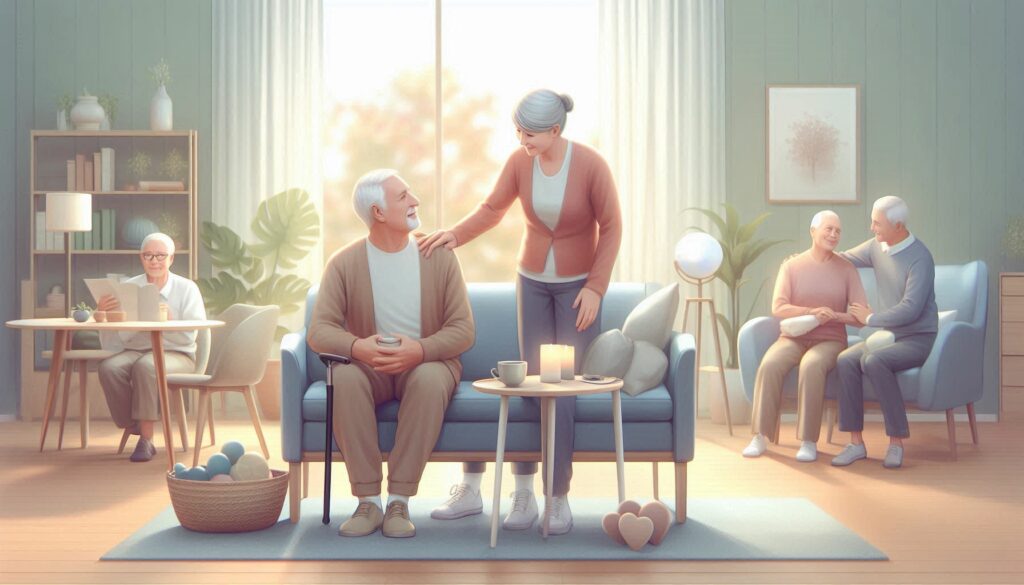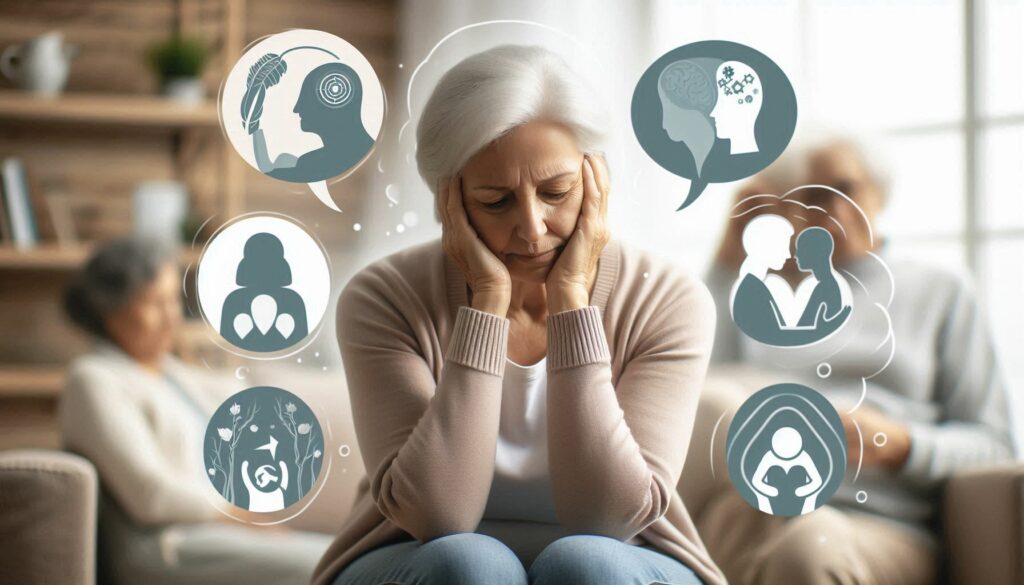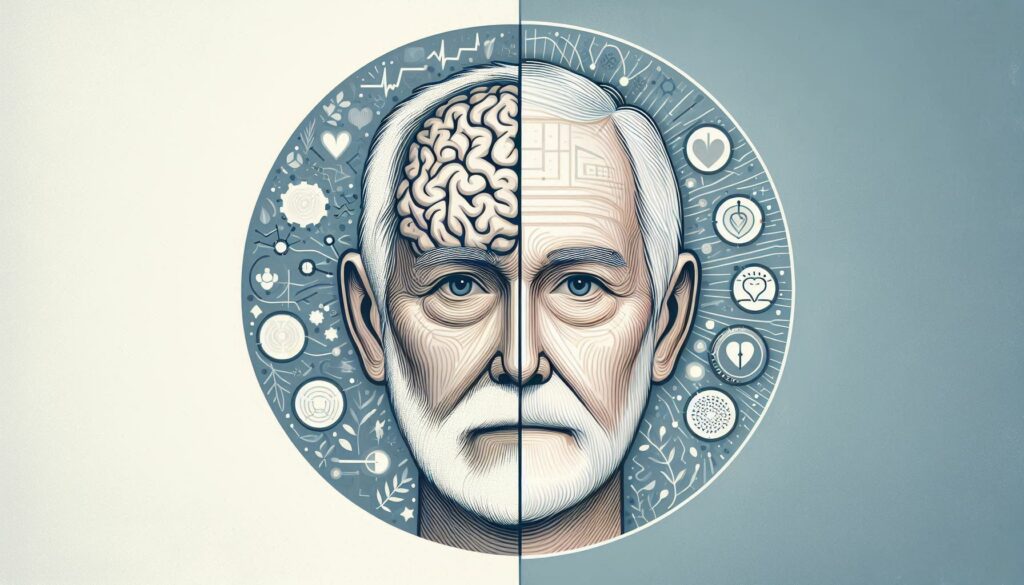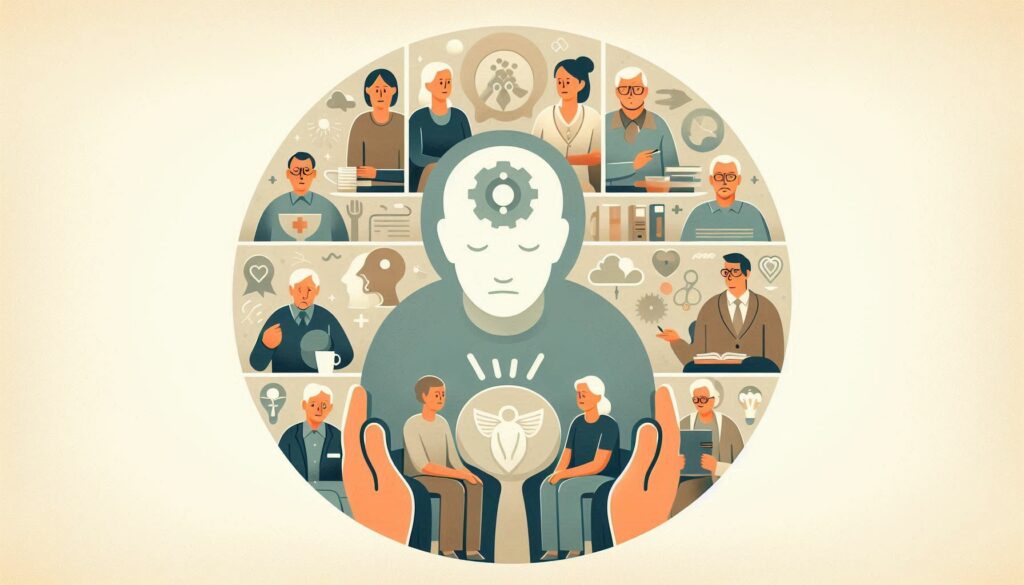Essential Tips to Master Mental Health for Seniors: Simple Strategies for Well-Being

Key Highlights
- Mental health is as crucial as physical health, particularly for seniors experiencing life changes.
- Recognizing mental illness symptoms in seniors, including depression and anxiety, is vital.
- Encouraging social connections and a healthy lifestyle can significantly impact seniors’ emotional well-being.
- Professional therapies, medications, and telehealth offer valuable support for navigating mental health challenges.
- Caregivers play a crucial role in supporting seniors’ mental health journey through understanding, patience, and resources.
Introduction
During the golden years, many hope for joy, relaxation, and memorable times with family members. Still, for some seniors, mental illness and emotional difficulties can create problems during this special time. Additionally, substance use might appear as a way to deal with issues that come with aging. Because of this, it’s important to see these challenges and give the right support. This way, we can help ensure a happy and satisfying life for our senior loved ones.
Understanding Mental Health in Seniors
Mental health includes our emotional, psychological, and social well-being. It affects how we feel, think, and behave. Like physical health, mental health is very important throughout life and especially in the senior years. During these years, we face different challenges and changes that can affect our mental well-being.

With factors such as retirement, changes in physical health, losing loved ones, and social isolation, seniors may feel loneliness, anxiety, or depression. Because of this, it’s important to realize that mental health isn’t just the lack of mental illness; it also involves having a sense of purpose, connection with others, and overall well-being.
The Importance of Mental Health Awareness in Aging
Mental health awareness is important at every stage of life, but it is especially important for seniors. According to the World Health Organization, a complete approach to health should include mental well-being, especially as people grow older. With aging, older adults might face different stressors and changes that can affect their mental health. Therefore, recognizing the signs of emotional distress is important for taking action early.
Serious mental illness can greatly reduce a senior’s quality of life, resulting in feelings of social isolation, poor physical health, and lower cognitive function. Through promoting open discussions about mental health and breaking down stereotypes tied to aging and emotional vulnerability, we can build a more supportive and understanding space for seniors to reach out for help when they need it.
By encouraging mental health awareness, we help people focus on their well-being, notice possible warning signs, and get help from healthcare professionals when necessary. Furthermore, families, caregivers, and communities play an essential role in fostering a culture of support that respects and encourages mental health among seniors.
Common Mental Health Challenges Faced by Seniors
Seniors might experience different mental disorders, which can include depression, anxiety, and more complex issues like bipolar disorder. With understanding these challenges, we can take the first step toward offering the right care and support.
For depression in older adults, common signs include ongoing sadness, losing interest in things they used to enjoy, trouble sleeping, and feelings of worthlessness. For anxiety, it may show up as worrying too much, feeling restless, or even having physical problems like headaches or tummy troubles. Often, substance abuse can happen too, such as using alcohol or misusing prescription drugs as a way to deal with these mental health struggles.

It’s important to keep in mind that these mental disorders can be treated. By seeking professional help, a senior’s well-being can improve a lot. If you think a loved one is having trouble with their mental health, it’s good to encourage them to contact a healthcare provider.
Recognizing Signs and Symptoms
Identifying mental health concerns in seniors can be tough because their symptoms often get confused with normal aging or other health issues. To recognize the signs and symptoms is important for helping them get the right support.
Changes in their behavior, like withdrawing from social activities, poor hygiene, or becoming more agitated, can show there are mental health problems. Along with that, changes in how they sleep, what they eat, and unexplained sicknesses like headaches or belly issues should also be concerning. When you see any noticeable changes in a senior’s usual behavior or mood, it’s important to help and encourage them to seek professional help.
Identifying Depression and Anxiety in the Elderly
Major depressive disorder and anxiety disorder are common mental health issues that can affect a senior’s overall well-being. Due to this, spotting the signs and symptoms early is important for getting the right help.
For seniors, depression might show up as ongoing sadness, feelings of hopelessness, or losing interest in activities they used to love. Also, they may feel tired, notice changes in how much they eat or sleep, and struggle with focusing. In contrast, anxiety tends to come across as constant worry, restlessness, being easily annoyed, trouble sleeping, and even physical signs like headaches or muscle tension.
Remembering that having these symptoms for longer than two weeks could mean there’s a mental health disorder that needs a professional check-up is important. If you see a family member showing any of these signs, encourage them to book an appointment with a healthcare provider or mental health professional who can help with a thorough evaluation and a tailored treatment plan. By recognizing and addressing these issues early, we can really make a difference in their lives and improve their quality of life.
Cognitive Decline vs. Mental Health Issues
Understanding the difference between cognitive decline and mental health concerns in seniors can be tough since some symptoms can be similar. Cognitive decline, which is often linked to dementia, usually means losing memory, thinking abilities, and the skill to carry out daily activities. On the other hand, mental health concerns, like depression or anxiety, can also disturb cognitive function. This disturbance might cause trouble with focusing, remembering things, and making decisions.
As we age, some mild cognitive issues are normal, but if there’s a big or quick change, it’s important to think about seeing a primary care provider. With their help, they can look for underlying reasons and decide what needs to be done next. Before diagnosing dementia, it is crucial to check for reversible causes of cognitive problems, such as side effects from medications, lack of vitamins, or thyroid issues.

To tell these conditions apart, a complete evaluation is necessary. This evaluation should consider medical history, a physical exam, cognitive tests, and a mental health assessment. By involving both medical and mental health professionals, seniors will receive a thoughtful evaluation along with an accurate diagnosis, which will help in getting the right treatment and support.
Preventative Measures for Mental Well-being
Taking proactive steps to protect mental well-being is really important as we get older. With healthy habits and meaningful social connections, seniors can make their overall quality of life better and lessen the chances of facing mental health issues.
By encouraging regular exercise, even mild activities like walking or gardening, it has been shown to boost mood and help with thinking skills. Additionally, a balanced diet that includes fruits, vegetables, and whole grains gives vital nutrients that support brain health and can improve how we feel emotionally.
Lifestyle Choices Supporting Mental Health in Seniors
Maintaining good physical health strongly connects to a positive mental state, especially for seniors. By engaging in regular physical activities, like a gentle walk or chair yoga, seniors can enjoy numerous benefits. These benefits include better mood, less anxiety, and improved sleep. Incorporating such activities into their daily life can make it enjoyable and easier for them.
In addition, a balanced and nutritious diet plays a vital role in fueling both body and mind. Many fruits, vegetables, and whole grains should be part of seniors’ meals, while it’s important to limit processed foods, sugary drinks, and unhealthy fats. Simple changes, such as cutting back on caffeine and drinking enough water, can greatly boost mental clarity and emotional well-being.
Moreover, getting enough sleep is essential for cognitive abilities and managing emotions. Seniors should establish a regular sleep schedule, create a calming bedtime routine, and make sure their sleeping environment supports restful sleep. These choices fit into daily life, promoting both physical health and a more positive view of life.
The Role of Social Connections in Enhancing Mental Health
Social connections matter a lot for everyone, but they are especially important for seniors. Through feeling connected to others, they can fight loneliness, lower stress, and improve overall well-being. By regularly meeting with family members, friends, and community members, seniors gain a sense of belonging and purpose.
Through traditional forms of communication that are still important, using technology offers a way to close gaps and build connections. Social media platforms, video calls, and online communities can help seniors stay in touch with loved ones no matter where they are. By using these tools, seniors can grow their social networks, all from their homes.
At senior centers and community organizations, there are great opportunities for socializing, engaging in hobbies, and joining group activities. It’s always possible to start new interests, meet new friends, and strengthen existing relationships. Encourage seniors to take part in fulfilling activities that bring them joy and purpose in their lives.
Treatment Options and Support
When making changes in lifestyle doesn’t help with mental health issues, many treatment options are there. Professional help can give personalized care for seniors facing mental health conditions, allowing them to move toward recovery and better well-being.
With therapy and medication, along with support groups and alternative therapies, many choices meet the special needs of seniors. By talking with a healthcare provider, you can find out the best treatment plan for your needs and preferences.
Professional Therapies and Medications
Professional therapies like psychotherapy and counseling offer a comfortable and caring environment for seniors to examine their thoughts, feelings, and behaviors. Within this safe space, these therapies can help with many mental health concerns, including depression, anxiety, grief, and relationship issues.

Along with therapy, medications play an important role in a well-rounded treatment plan. Antidepressants, anti-anxiety medications, and mood stabilizers can reduce symptoms, balance mood, and enhance the overall quality of life. It is important to consult a healthcare provider or psychiatrist for proper diagnosis, medication management, and to talk about possible side effects or interactions.
For some cases, treatments like transcranial magnetic stimulation (TMS) may be suggested. TMS is a non-invasive brain stimulation therapy showing good results in treating depression and other mental health conditions. By partnering with mental health professionals, seniors can find different treatment options customized to their needs and preferences, helping them move toward recovery and well-being.
Incorporating Technology and Telehealth
The rise of telehealth has been transformative in expanding access to mental health care, particularly for seniors. Online platforms and mobile applications offer convenient and discreet avenues for seniors to access therapy sessions, medication management, and mental health resources from the comfort of their homes.
Telehealth eliminates geographical barriers and transportation challenges that might hinder some seniors from accessing in-person appointments. It also offers a sense of privacy and comfort for those hesitant to discuss mental health concerns in traditional settings.
| Telehealth Benefits for Seniors | How it Helps |
| Virtual Therapy Sessions: | Access mental health professionals remotely, alleviating travel burdens and offering flexibility. |
| Medication Management: | Discuss medication adjustments, refills, and potential side effects with healthcare providers online. |
| Online Support Groups: | Connect with peers facing similar challenges, combating isolation and fostering peer support. |
| Mental Health Apps: | Utilize apps for mood tracking, mindfulness exercises, guided meditation, and personalized coping strategies. |
Strategies for Caregivers
Caregivers play a key role in helping seniors who deal with mental health issues. Yet, this job can be both tough and emotionally draining. By giving caregivers the right tools and strategies, they can not only provide better care but also take care of their own well-being.
Knowing the particular mental health challenges their loved ones experience is very important for offering personalized support. By learning about the symptoms, treatment methods, and ways to cope, caregivers can give thoughtful and understanding care.
How to Support Mental Health in Senior Loved Ones
Supporting a senior who is having mental health problems needs patience, understanding, and a commitment to looking after their well-being. By having open and honest communication, you help build trust and create a safe space for seniors. They should feel comfortable sharing their feelings without fear of being judged.
Encourage them to take part in activities they liked in the past, like going for a walk or grabbing coffee with a friend. Through nurturing their social connections, you can help reduce feelings of loneliness and create a sense of belonging, which is important for mental health. Caregiver support is also very important. Look for support groups or online forums where you can meet people facing similar problems. You will be able to share stories and gather useful tips.
You should remember that resilience and inner strength can become stronger, even when times are tough. Inspire seniors to try things that give them peace and purpose, such as being outdoors, being creative, or exploring their spirituality. By nurturing these areas of their lives, seniors may find a renewed sense of hope and purpose.
Navigating Challenges and Finding Resources
Facing the challenges of mental health care can seem tough, but there are many resources ready to help seniors and their families. Among these, the crisis lifeline stands out. This is a service that operates 24/7 and gives immediate help to people dealing with mental health emergencies. It’s a good idea for seniors to save the lifeline number in their phones. They should remember that help is always near, especially during hard times.
Looking for resources focused on seniors’ mental health needs is important for getting the right care. Many trusted sources, like the National Institute on Mental Health and the American Psychological Association, provide a lot of information. This includes fact sheets, helplines, and tools available online.
Senior centers in the local area, community groups, and houses of worship often bring awareness through support groups, counseling, and workshops designed for seniors. You should not hesitate to connect with these organizations since they can help seniors find the right support.
Mental Health Resources for Seniors
Getting good and thorough mental health resources is very important for seniors who need support. Luckily, many local and national groups focus on helping seniors with their mental well-being. Through these organizations, seniors can find a variety of services. These include counseling, support groups, and educational programs. Such programs aim to give seniors the skills and tools they need to handle mental health issues.

By using these resources, seniors can find the right support for their individual needs. With this in mind, don’t hesitate to reach out and look into the many options available; taking that initial step to ask for help can create a big change.
Local and National Support Services
In the United States, there is a strong system of local and national support services focused on mental health needs. The Substance Abuse and Mental Health Services Administration (SAMHSA), which is part of the U.S. Department of Health and Human Services, leads this initiative by providing resources and information for individuals and families throughout the country. On SAMHSA’s website, people can find a complete guide, pointing them to local support, national services, and emergency hotlines for immediate help.
In many communities, senior centers and community mental health centers are available to offer counseling, support groups, and educational workshops meant for older adults. These centers are essential, helping seniors connect with others who face similar issues, allowing them to share their experiences, and creating a sense of belonging.
It’s important to understand that reaching out for help shows strength and highlights the importance of taking care of oneself. By using these readily available resources, individuals can greatly improve their quality of life and move towards healing and recovery.
Online Platforms and Communities for Seniors
In the digital age, many new ways have come up for seniors to find support and meet others who face similar issues. There are many online communities and platforms that focus on seniors’ mental health. On these secure websites, there are forums, chat rooms, and virtual support groups. Here, individuals can easily connect with peers, share their experiences, and find helpful resources—all from the comfort of their homes.
It’s very important to use platforms that care about privacy and security. Sensitive information shared online must be protected. Check for trusted organizations, like government websites (.gov) or well-known mental health institutions, which follow strict data protection rules. On these platforms, individuals can enjoy a safe and private space to connect and look for help without risking their safety.
Using online platforms can be uplifting for seniors. It creates a sense of community, helps to lessen feelings of isolation, and gives access to useful resources. Since these platforms offer anonymity and convenience, they work well for those who may feel uncomfortable talking about mental health concerns in more traditional contexts. This encourages seniors to reach out for support and find essential resources.
Personal Stories of Overcoming Mental Health Challenges
Listening to real-life stories from people who have overcome mental health challenges can be very encouraging for seniors. Hearing or reading about personal tales of resilience and recovery gives us hope and shows that we are not the only ones facing these struggles.
These stories emphasize the various experiences of aging and demonstrate the strength found in the human spirit. Through their shared journeys, individuals provide important insights about coping strategies, treatment possibilities, and how vital it is to seek help.
Inspiring Accounts from Seniors Who Found Joy and Purpose
Personal stories from seniors who have faced mental health challenges show how strong the human spirit can be in finding joy and purpose even during tough times. Through these inspiring accounts, we can see the importance of resilience, self-discovery, and seeking help when needed.

From finding passions again after feeling down, some stories talk about joy discovered through art, music, or being in nature. Through community connections, like volunteering or joining a support group, others share how they filled a gap in their lives and gained a fresh sense of purpose.
These accounts go beyond just showing victories over struggles. They also act as guidance for people going through their own tough times. With support, self-care, and a dedication to healing, these stories remind us that it’s possible to find joy and purpose, no matter our age or situation.
Lessons Learned and Advice Shared
The wisdom that comes from experiences in life is super important. When seniors talk about their stories, they give a lot of helpful information for others to learn from. Through these shared experiences, they can offer useful advice about understanding the healthcare system, creating a support network, and finding ways to cope.
Seniors who have faced mental health challenges often talk about how important it is to be kind to ourselves. They remind us that asking for help and recognizing our problems is completely normal. They suggest that showing vulnerability can be a strength, and seeking help from mental health professionals, friends, and support groups is really beneficial.
By talking about the lessons they have learned, seniors who have walked these paths shine a light of hope and guidance for others. They make us remember that recovery can happen, and we all have the power inside us to face these difficulties and reach for a better future.
Conclusion
It is very important to put mental health first for seniors because it greatly affects their general well-being. Through raising awareness, we can spot their problems and put in place preventative steps that help improve mental well-being for older people. With the help of having connections with family, asking for professional help, and using technology, caregivers and seniors can find useful resources. Keep in mind that promoting mental health involves teamwork, understanding, compassion, and being involved. Let us keep supporting our seniors as they work toward better mental health and enjoy happy lives.

Frequently Asked Questions
How do I start a conversation about mental health with a senior?
Starting a chat about mental health needs you to treat the topic carefully and with respect. You could begin by saying something you’ve noticed about their well-being while showing that you truly care. In a comfortable and private place, you should create a space where they feel safe to open up. By assuring them that their feelings count and that you’re ready to listen without judging, you can make it easier for them to talk.
What are the best practices for maintaining mental health in old age?
Maintaining mental health as you grow older means focusing on staying connected with others, keeping physically active, and doing things that stimulate your mind. It’s important to also prioritize a balanced diet, get enough sleep, and ask for professional help if necessary. Always remember that mental well-being is something you work on throughout your life.
Where can seniors find community support for mental health issues?
Seniors looking for help with mental health problems can find different resources. At local senior centers, there are community mental health centers available. Through online platforms focused on senior mental health, support groups can be accessed, along with counseling services and educational workshops designed just for their particular needs.
Can lifestyle changes really improve a senior’s mental health?
Yes, changes in lifestyle can really help a senior’s mental health. By including regular exercise, eating healthy foods, focusing on social connections, and taking part in activities that stimulate the mind, seniors can see a boost in their mood, lower stress levels, and feel better overall.






